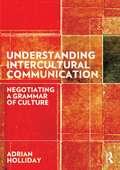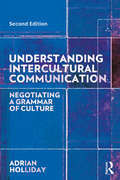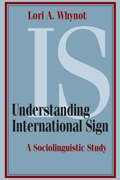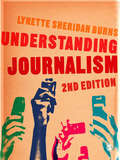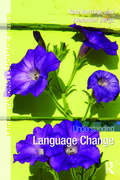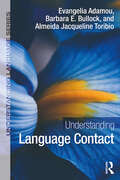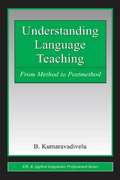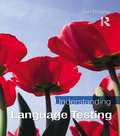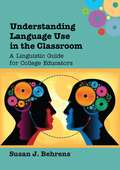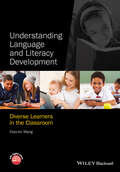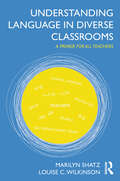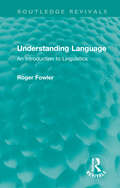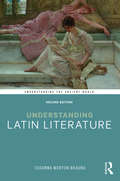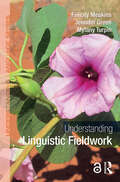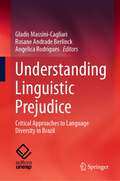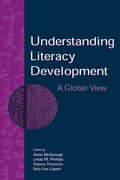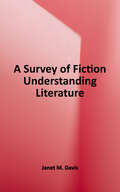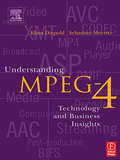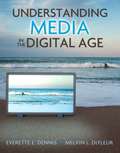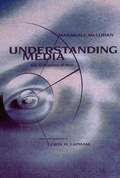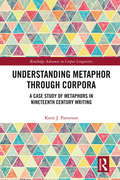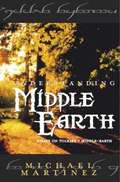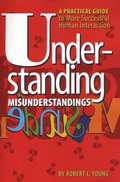- Table View
- List View
Understanding Intercultural Communication: Negotiating a Grammar of Culture
by Adrian HollidayIn this book, Adrian Holliday provides a practical framework to help students analyse intercultural communication. Underpinned by a new grammar of culture developed by Holliday, this book will incorporate examples and activities to enable students and professionals to investigate culture on very new, entirely non-essentialist lines. This book will address key issues in intercultural communication including: the positive contribution of people from diverse cultural backgrounds the politics of Self and Other which promote negative stereotyping the basis for a bottom-up approach to globalization in which Periphery cultural realities can gain voice and ownership Written by a key researcher in the field, this book presents cutting edge research and a framework for analysis which will make it essential reading for upper undergraduate and postgraduate students studying intercultural communication and professionals in the field.
Understanding Intercultural Communication: Negotiating a Grammar of Culture
by Adrian HollidayUnderstanding Intercultural Communication provides a practical framework to help readers to understand intercultural communication and to solve intercultural problems. Each chapter exemplifies the everyday intercultural through ethnographic narratives in which people make sense of each other in home, work and study locations. Underpinned by a grammar of culture developed by the author, this book addresses key issues in intercultural communication, including: the positive contribution of people from diverse cultural backgrounds; the politics of Self and Other which promote negative stereotyping; the basis for a de-centred approach to globalisation in which periphery cultural realities can gain voice and ownership. Written by a leading researcher in the field, the new edition of this important text has been revised to invite the reader to reflect and develop their own intercultural and research strategies, and updated to include new ideas that have emerged in Holliday’s own work and elsewhere. This book is a key resource for academics, students and practitioners in intercultural communication and related fields.
Understanding International Sign: A Sociolinguistic Study
by Lori A. WhynotIn Understanding International Sign, Lori A. Whynot examines International Sign (IS) to determine the extent to which signers from different countries comprehend it. She focuses exclusively on expository lecture IS used in conference settings and presents the first empirical research on its effectiveness for communicating rich information to diverse audience members. International Sign is regarded as a lingua franca that is employed by deaf people to communicate with other deaf people who do not share the same conventionalized local sign language. Contrary to widely-held belief, sign languages are not composed of a unified system of universal gestures—rather, they are distinctly different, and most are mutually unintelligible from one another. The phenomenon of IS has emerged through increased global interaction during recent decades, driven by a rise in the number of international conferences and events and by new technologies that allow for enhanced global communication. IS is gaining acceptance for providing communicative access to conference audience members who do not have knowledge of the designated conference languages, and it is being recruited for use due to the prohibitive expense of providing interpreting services in numerous different sign languages. However, it is not known how well audience members understand IS, and it may actually limit equal access to the interpreted information. Whynot compares IS to native sign languages and analyzes the distribution of linguistic elements in the IS lexicon and their combined effect on comprehension. Her findings indicate that audiences with diverse sign languages understand much less of IS presentations than has been previously assumed. Whynot’s research has crucial implications for expository IS usage, training, and interpreting, and it sheds light on the strengths and weaknesses inherent in cross-linguistic, signed contact settings.
Understanding Journalism
by Lynette Sheridan BurnsThe new era of Google, Twitter and Facebook has fundamentally shifted the journalist's relationship with the audience. To navigate these new realities, it is imperative for journalism students to master skills in cross-platform writing, and understand the implications on their communication decisions. This second edition of Understanding Journalism tackles these changes head-on. It integrates media and cultural theory with the step-by-step development of writing skills to give students the techniques and the savvy they need to succeed. Bigger and better, this new edition includes: A new chapter on who journalists are in the social media age Reorganization of journalism skills chapters to bring writing and editing to the fore Full coverage and examples on Twitter, social media, SMS formats In-depth exploration of the ethical issues raised by new media platforms All new exercises, case scenarios and further readings It is the essential guide for all students of journalism.
Understanding Language Change (Understanding Language)
by Kate Burridge Alexander BergsThe Understanding Language series provides approachable, yet authoritative, introductions to all the major topics in linguistics. Ideal for students with little or no prior knowledge of linguistics, each book carefully explains the basics, emphasising understanding of the essential notions rather than arguing for a particular theoretical position.Understanding Language Change offers a complete introduction to historical linguistics and language change. The book takes a step-by-step approach, first by introducing concepts through English examples and building on this with illustrations from other languages. Key features of this introductory text include: up to date and recent case studies at the end of each chapter chapter summaries and exercises that feature a wide range of languages coverage of application of historical linguistics in each chapter glossary of terms This book is essential reading for any students studying Historical Linguistics for the first time.
Understanding Language Contact (Understanding Language)
by Almeida Jacqueline Toribio Evangelia Adamou Barbara E. BullockUnderstanding Language Contact offers an accessible and empirically grounded introduction to contact linguistics. Rather than taking a traditional focus on the outcomes of language contact, this book takes the novel approach of considering these outcomes as an endpoint of bilingualism and multilingualism. Covering speech production and comprehension, language diffusion across different interactional networks and timeframes, and the historical outcomes of contact-induced language change, this book: Discusses both how these areas relate to one another and how they correspond to different theoretical fields and methodologies; Draws together concepts and methodological/theoretical advances from the related fields of bilingualism and sociolinguistics to show how these can shed new light on the traditional field of contact linguistics; Presents up-to-date research in a digestible form; Includes examples from a wide range of contact languages, including Creoles and pidgins; Indigenous, minority, and heritage languages; mixed languages; and immigrants' linguistic practices, to illustrate ideas and concepts; Features exercises to test students’ understanding as well as suggestions for further reading to expand knowledge in specific areas. Written by three experienced teachers and researchers in this area, Understanding Language Contact is key reading for advanced undergraduate and postgraduate students approaching bilingualism and language contact for the first time.
Understanding Language Teaching: From Method to Postmethod (ESL & Applied Linguistics Professional Series)
by B. KumaravadiveluThis book traces the historical development of major language teaching methods in terms of theoretical principles and classroom procedures, and provides a critical evaluation of each. Drawing from seminal, foundational texts and from critical commentaries made by various scholars, Kumaravadivelu examines the profession's current transition from method to postmethod and, in the process, elucidates the relationship between theory, research, and practice. The chief objective is to help readers see the pattern that connects language, learning, teaching methods, and postmethod perspectives.In this book, Kumaravadivelu:*brings together a critical vision of L2 learning and teaching--a vision founded at once on historical development and contemporary thought;*connects findings of up-to-date research in L2 learning with issues in L2 teaching thus making the reader aware of the relationship between theory, research and practice;*presents language teaching methods within a coherent framework of language-, learner-, and learning-centered pedagogies, thus helping the reader to see how they are related to each other;*shows how the three categories of methods evolved historically leading ultimately (and inevitably) to the emergence of a postmethod condition; and*provides the reader with a solid background in several interconnected areas of L2 pedagogy, such as concepts of competence, input factors, intake processes, interactional modifications, and instructional design.Understanding Language Teaching: From Method to Postmethod is intended for an international audience of teacher educators, practicing teachers and graduate students, researchers, curriculum planners, and materials designers in the field of second and foreign language teaching.
Understanding Language Testing (Understanding Language)
by Dan DouglasUnderstanding Language Testing presents an introduction to language tests and the process of test development that starts at the very beginning. Assuming no knowledge of the field, the book promotes a practical understanding of language testing using examples from a variety of languages. While grounded on solid theoretical principles, the book focuses on fostering a true understanding of the various uses of language tests and the process of test development, scoring test performance, analyzing and interpreting test results, and above all, using tests as ethically and fairly as possible so that test takers are given every opportunity to do their best, to learn as much as possible, and feel positive about their language learning. Each chapter includes a summary, suggestions for further reading, and exercises. As such this is the ideal book for both beginning students of linguistics and language education, or anyone in a related discipline looking for a first introduction to language testing.
Understanding Language Use in the Classroom
by Susan J. BehrensIt is clear that a proper understanding of what academic English is and how to use it is crucial for success in college, and yet students face multiple obstacles in acquiring this new 'code', not least that their professors often cannot agree amongst themselves on a definition and a set of rules. Understanding Language Use in the Classroom aims to bring the latest findings in linguistics research on academic English to educators from other disciplines, and to help them help their students learn and achieve. Behrens combines a powerful argument for the importance of explicit teaching of language skills in college with answers to common questions from professors and students, as well as sample teaching materials to help make these issues come alive in the classroom.
Understanding Language and Literacy Development
by Xiao-Lei WangUnderstanding Language and Literacy Development: Diverse Learners in the Classroom offers effective supporting strategies to address the cultural and linguistic diversity of students in contemporary classrooms. Discusses learners with different linguistic abilities--infancy, early childhood, middle childhood, and adolescence--by suggesting effective ways to reach them based on their strengths and needs Emphasizes language and literacy supporting strategies in a variety of everyday classroom settings Includes activities and questions to motivate readers to think and develop their own perspectives on language and literacy development Considers a variety of different language acquisition experiences, including monolingual, multilingual, and language impairment Discusses different types of literacies, including digital and hypertext Connects language and literacy development to identity and motivation to contextualize learning styles for pre-service teachers Supported by a companion website that includes additional resources such as PowerPoint presentations by chapter and a summary of relevant information from the Common Core K-12 English Language Arts Standards
Understanding Language in Diverse Classrooms: A Primer for All Teachers
by Marilyn Shatz Louise C. WilkinsonWith the increasing linguistic and cultural diversity of students in U. S. schools, all teachers, regardless of the content area or grade they teach, need research-based strategies for assisting all students to gain English proficiency. This practical, concise guide shows teachers what they need to know about language, how it is learned, how it is used, and how teaching about it can be incorporated into lessons throughout the curriculum. Understanding Language in Diverse Classrooms offers a model of how learning takes place and describes the critical role of teachers in that model. It includes comparison charts showing how some of the most common heritage languages represented among present-day students compare with English, and it provides examples of hands-on materials including checklists, rating scales, and sample lessons to help teachers prepare to teach all their students in diverse classrooms. Each chapter ends with questions to stimulate discussion and reflection on major chapter points, to enable readers to review and evaluate the information and then integrate it into their own practice.
Understanding Language: An Introduction to Linguistics (Routledge Revivals)
by Roger FowlerIt is widely recognized that language is humanity’s most distinctive and valuable faculty. In this work, originally published in 1974, Roger Fowler explains the character and absorbing interest of language. Designed as an introductory text for students and others concerned with human communication, the book is clearly and concisely written, yet it in no way oversimplifies its rich and complicated subject. The opening chapters set the scene by a discussion of the power of language in the social and psychological life of a man, while the main body of the book is an introduction to linguistics, the science of language study. Coverage is provided of the main topics in linguistic description – semantics, syntax, phonetics – as well as of the functions of language, its status in society and its relation to the individual. The reader is invited to participate in some advanced thinking within an up-to-date and consistent linguistic theory. Particular attention is given to the individual as language-learner, since the process of language acquisition illuminates most clearly the naturalness and the complexity of language. The author’s arguments are illustrated with hundreds of examples from English and other languages. Suggestions for further reading are included in the exposition, and the reader who follows the arguments and pursues the carefully arranged bibliographical recommendations will acquire a substantial insight into contemporary linguistics – the most important and advanced of the modern human sciences.
Understanding Latin Literature
by Susanna Morton BraundUnderstanding Latin Literature is a highly accessible, user-friendly work that provides a fresh and illuminating introduction to the most important aspects of Latin prose and poetry. This second edition is heavily revised to reflect recent developments in scholarship, especially in the area of the later reception and reverberations of Latin literature. Chapters are dedicated to Latin writers such as Virgil and Livy and explore how literature related to Roman identity and society. Readers are stimulated and inspired to do their own further reading through engagement with a wide selection of translated extracts and through understanding the different ways in which they can be approached. Central throughout is the theme of the fundamental connections between Latin literature and issues of elite Roman culture. The versatile and accessible structure of Understanding Latin Literature makes it suitable for both individual and class use.
Understanding Linguistic Fieldwork (Understanding Language)
by Jennifer Green Felicity Meakins Myfany TurpinUnderstanding Linguistic Fieldwork offers a diverse and practical introduction to research methods used in field linguistics. Designed to teach students how to collect quality linguistic data in an ethical and responsible manner, the key features include: A focus on fieldwork in countries and continents that have undergone colonial expansion, including Australia, the United States of America, Canada, South America and Africa; A description of specialist methods used to conduct research on phonological, grammatical and lexical description, but also including methods for research on gesture and sign, language acquisition, language contact and the verbal arts; Examples of resources that have resulted from collaborations with language communities and which both advance linguistic understanding and support language revitalisation work; Annotated guidance on sources for further reading. This book is essential reading for students studying modules relating to linguistic fieldwork or those looking to embark upon field research.
Understanding Linguistic Prejudice: Critical Approaches to Language Diversity in Brazil
by Gladis Massini-Cagliari Rosane Andrade Berlinck Angelica RodriguesThis book discusses linguistic diversity, linguistic prejudice, and language variation and change from a Global South perspective by analyzing Brazilian Portuguese, Brazilian Sign Language (LIBRAS) and indigenous languages spoken in Brazil. It brings together studies and reflections on linguistic prejudice and social discrimination based on data and examples from Brazil and aims to bridge the gap between academic findings and popular notions related to linguistic diversity to promote language diversity and fight linguistic intolerance. Chapters in this volume present contributions to understand the origins and motivations of linguistic prejudice and foster awareness of entrenched opinions regarding linguistic diversity. The first part of the book brings together chapters analyzing basic sociolinguistic questions concerning linguistic prejudice based on theoretical discussions and qualitative research. The second part is composed of chapters that analyze linguistic prejudice in Brazil in major communities that speak Brazilian Portuguese varieties and minor communities that speak native and sign languages. Understanding Linguistic Prejudice: Critical Approaches to Language Diversity in Brazil will be a valuable resource for researchers in sociolinguistics interested in language diversity, language justice and language policy. It will also be of interest to sociologists, anthropologists and other social scientist interested in the relationship between language, diversity, equity and inclusion.
Understanding Literacy Development: A Global View
by Linda M. Phillips Anne McKeough Vianne Timmons Judy Lee LupartThe acquisition and maintenance of literacy is of pressing interest and concern to educators and educational policy makers worldwide. What are the common themes, the common questions, and the unique circumstances and initiatives that spring from this interest and concern? To address these questions, Understanding Literacy Development: A Global View brings together leading experts from around the world to explore ways to best provide teaching and learning opportunities, tailored to specific educational needs, to help all children become better readers.The premise is that current generic "one-size-fits-all" approaches are inappropriate for many children and can lead to underachievement and failure. The contributors write from a stance that reflects not only their own particular expertise and experience, but also sheds light on literacy development across cultures, countries, and circumstances. Taken together, chapters in this volume target a wide and comprehensive set of literacy issues, and offer an extensive exploration of the complexities of literacy development, including issues related to early literacy, school instruction, family literacy, adolescent and adult literacy, and teacher development.At a time when education is burdened by increasing economic pressure to do more with less, it is imperative that educators and decision makers at all levels have access to current, broad-ranging, and in-depth information and evidence to inform their choices. This volume, compiling critical research on a wide spectrum of literacy concerns, is an invaluable tool for scholars, teacher educators, professionals and graduate students in the fields of literacy education, early childhood education, educational psychology, educational policy, and related areas.
Understanding Literature
by Macmillan Mcgraw-HillThe stories in the book are grouped according to some of the basic elements that an author works with when writing a story: plot, character, setting, point of view, and theme. The last group of stories illustrates the total effect achieved from skillfully varying and intermingling these basic ingredients. These elements contain the key to approaching any story with deeper understanding and greater pleasure.
Understanding Literature: A Survey of Fiction
by Janet M. DavisA Survey of Fiction Excerpts from the classics are used to teach skills such as character development, setting, plot structure, and conflict/resolution. Students learn to appreciate literature more fully and independently. Reading and Writing Nonfiction Students learn about various forms of nonfiction writing, first by reading and then writing. Explores several essay formats: Informative, Classification, Analogy, Descriptive, Autobiographical/Biographical, Anecdotal, Logical Argument, and Emotional Appeal.
Understanding MPEG 4: Technology and Business Insights
by Sebastian Moeritz Klaus DiepoldThe Practical Guide to MPEG 4 offers an up to date introduction to this important interactive and multimedia compression standard (including MPEG-4 Part 10), with real examples and information as to how and where this new technology should be used. All aspects of MPEG-4 that are relevant in today's technical landscape are described in this book, including video and audio creation, production, distribution, reception and consumption environment. This book explains everything you really need to know in jargon-free language: interactive systems, content management, deployment, licensing and business models.
Understanding Media in the Digital Age: Connections for Communication, Society, and Culture
by Everette E. Dennis Melvin L. DefleurThe book shows readers how to navigate the world of traditional and new media while fostering an understanding of mass communication theory, history, active research findings, and professional experience.
Understanding Media: The Extensions of Man
by Marshall McluhanIn a new introduction to this edition of Understanding Media, Harper's editor Lewis Lapham reevaluates McLuhan's work in the light of the technological as well as the political and social changes that have occurred in the last part of this century.
Understanding Metaphor through Corpora: A Case Study of Metaphors in Nineteenth Century Writing (Routledge Advances in Corpus Linguistics)
by Katie PattersonThis book introduces a unique methodology to the study of metaphor, integrating a corpus linguistic approach to explore the lexical, grammatical, semantic, and pragmatic characteristics of metaphoric instances of language. The volume questions the reliability of attempts to identify metaphor based on dichotomy and, drawing on data from a corpus of nineteenth-century writing, instead advocates for the notion that metaphoricity is context-dependent and fluid, in relation to the respective social and discourse contexts in which metaphors can be found. The book also applies Lexical Priming Theory to metaphoric language to suggest that our use of metaphor is due to unconscious behaviors, a counterpoint to perspectives that see metaphor use as part of the creative process. Taken as a whole, the volume calls for a deeper investigation of the complex web of meaning senses that contributes to our understanding of metaphor, making this key reading for students and researchers in corpus linguistics, metaphor studies, lexicography, semantics, and pragmatics.
Understanding Middle Earth: Essays on Tolkien's Middle-Earth
by Michael MartinezMichael Martinez calls himself a populist commentator. He has long been an advocate for fans of science fiction honing his encyclopedic knowledge of all of the works of J. R. R. Tolkien with Tolkien special interest groups on the internet, arranging Tolkien programming at fan run science fiction and fantasy conventions and making live, sophisticated presentations to audiences world wide. His coverage of Tolkien Topics in this collection of 36 essays is so thorough that you will feel as if Martinez has left no stone on Middle-earth unturned. He explains how the first elves lost their innocence taking their first step on a long road, filled with loss and grief, toward sorrow. He describes what they lost on their 500 year journey across a frozen wasteland and how Melkor's lies transformed artists who celebrated beauty to avaricious, vengeful, murdering, hoarders. He outlines the long lives of some of our favorite Elves including Gil-galad, Glorfindel and Legolas. He explains how the roles of elves changed through the long ages. For example, Elrond evolved from a warrior to an innkeeper. Exuberant, benevolent yet powerful Tom Bombadil is beloved by most Tolkien readers. Martinez illustrates Bombadil's importance to The Lord of the Rings and makes a strong case that it is a mistake to underrate him or pass him over as nonessential to the plot. We learn that only a few elves were vegetarians and that limbas is much like our cornbread though the corn used by the elves was a special, magical variety. Most of Tolkien's evil characters paid dearly for their deviation from goodness. In one essay Martinez explains why unlike other villains, Frodo is forgiven for crumbling and claiming the ring as his own instead of casting it in to the fire. This long book answers many of your questions about Tolkien's writing and stimulates further thought and debate on Tolkien's complex fantasy. Whether you read it all or skip to the essays that interest you, time spent reading this fascinating, well grounded book will enrich your Tolkien experience. A list of accented words with a key identifying the specific accents is provided on pages III and IV.
Understanding Minimalism
by Jairo Nunes Norbert Hornstein Kleanthes K. GrohmannMinimalist models of grammar are developed logically in this volume and the ways in which they contrast with GB analysis are clearly explained. Spanning a decade of minimalist thinking, the textbook will enable students to better understand the questions and problems that minimalism invites, and to master the techniques of minimalist analysis. Over 100 exercises are provided, encouraging students to put their new skills into practice. The book will be an invaluable text for intermediate and advanced students of syntactic theory, as well as a solid foundation for further study and research within Chomsky's minimalist framework.
Understanding Misunderstandings: A Practical Guide to More Successful Human Interaction
by Robert L. YoungHave you ever meant one thing, but said another? Reacted angrily when no offense was intended? Wished that the earth would open up and swallow you? Understanding Misunderstandings will help you get out and stay out of these difficulties. Robert L. Young explains why many common types of misunderstandings arise and how they can be avoided or corrected. In the first part of the book, he breaks the process of misunderstanding down into stages, showing how it can occur when we misspeak, mishear, misinterpret, or react in inappropriate ways. In the second part, he expertly analyzes the kinds of misunderstandings that can arise from differences in culture, social class, race and ethnicity, and gender. Real-life examples illustrate many of the problems and solutions he describes. Because misunderstanding can destroy friendships and marriages, wreck careers, and lead to clashes between whole segments of society, understanding and diffusing it is of the utmost importance. This reader-friendly book provides the practical guidance to do just that. Educators, business people, psychologists, parents-in fact, everyone who interacts with other people-will benefit from it.
